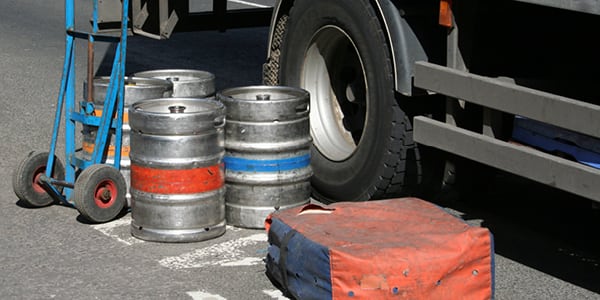While external pressures currently dominate the focus of most pub operators, there are several undetected, yet commonplace, internal struggles that are quietly sabotaging many operations from within. Unless these hidden issues are addressed effectively, pubs are at risk of losing profits and are at a disadvantage compared to their competitors in an already challenging market.
Nationwide audits by Venners reveal alarming annual losses in the hospitality sector. These losses are frequently linked to flawed controls caused by poor processes, human errors and even fraud, resulting in stock and revenue being missed, lost or wasted. Whilst pub owners fight their own unique battles and combination of circumstances, it is becoming more critical than ever for them to find ways to protect themselves from the internal operational kryptonite threats they are exposed to.
1. Weak currency and stock security
Ensuring that both currency and stock are effectively stored in their designated, secure areas requires a robust layer of controls. Although one would not expect these controls to be complex, they are surprisingly easy to overlook and often go neglected. Particularly careless management of keys to secure areas, combined with a lack of scrutiny over who has access, when they have access, and why they need that access, opens the door to numerous vulnerabilities. Implementing clear accountability procedures and maintaining accurate records for traceability purposes is crucial for safeguarding stock, revenue and staff. This also helps to deter malicious staff behaviour, such as the substitution of PDQ machines which may be used to siphon money into a personal bank account.
2. Haphazard procurement habits
When external pressures plague pub management, trend analysis on what is selling or in-demand becomes both a challenge of time and prioritisation. It is why in recent times pub ordering habits have seemingly become more reckless, resulting in a rise in overstocking and understocking. Many pub businesses have stock sat on the shelves, in the cellar, or in store areas, not making any money; whilst others are unable to service customers with products listed on their menus, damaging their reputation. Generally speaking, the phrase, ‘The less stock held, the lower the risk involved’, is a useful motto to adopt. However, there is a fine line that can be easily crossed into not holding enough stock, especially if forecasts are inaccurate or unsubstantiated.
3. Poor inventory management processes
Inventory management and procurement are inextricably linked. In fact, the success of the first underpins the success of the latter. In the first instance, inventory management relies on correct system input to produce accurate reports on stock movements and levels of stock held within a business. Although some pub operators get this first stage of the inventory management process right, many forgo the next crucial step to gaining vital data: performing recurring stocktakes. Beyond enabling basic adjustments to stock management strategies and maintaining overall stock control, the process of stocktaking is necessary for understanding what gross profit levels have been achieved on each product, laying the groundwork for trend analysis on popular products and seasonal items.
4. Delivery discrepancies and vulnerabilities

According to Venners, the majority of stock deficits pub businesses face are due to the lack of delivery procedures they have in place. Discrepancies in dates, weights and quantities between what has been delivered versus what was originally ordered, can be rectified if delivery notes are checked properly before the delivery is accepted. Many businesses also miss the importance of accompanying delivery personnel, making themselves vulnerable to untoward behaviour. An easy way to spot if a business has issues with its delivery procedures is by investigating losses that are highlighted on stock reports.
5. Inappropriate till usage
Many pub operators do not have, or make time, to either outline or analyse staff standards on till usage. The analysis of sales and till data can be critical in highlighting concerns with particular transactions and products. It can also identify employees who regularly perform unexpected corrections – whether these be error corrections, no sales or refunds. The concern in these cases is that there is intentional manipulation of revenue reporting, which should not be left unchallenged. Alternatively, it may indicate a serious lack in training on the proper usage of tills. Qualified professionals can amalgamate till reports and sales data to review these types of risks and identify methods to overturn these issues.
6. Unregulated supplier costs
Supplier errors are easily missed, but one mistake on just one product from a supplier can cost a pub hundreds, or even thousands of pounds. Ensuring that supplier costs are upheld to the originally agreed prices is a wise investment in time. The reality is that few businesses regularly monitor supplier costs, resulting in them missing invoice inflation and opportunities to request credit notes when errors are made. Supplier cost prices should be reviewed and continually checked even after an agreement has been reached.
7. Substandard cost strategies
Due to time and resource constraints, many pub operators base their decisions on basic menu costings. These costings often fail to incorporate valuable industry benchmarks and once implemented are then forgotten. The true value of menu costings, however, lies in regularly reviewing them and then updating them in detail. Only then does it become possible to determine what exactly happens with stock and revenue in the day-to-day running, versus what was planned, hoped for, or expected in the forecasts. It is not until one extrapolates these results over weeks or months that businesses very quickly start seeing their forecasted margins and profits slip away.
8. Lax staff policies
Policies form a key part of managing operations and controlling costs. There are many policies that become internal pain points when not properly constructed, incentivised, monitored or reviewed. Moreover, unless internal communications reflect policy requirements adequately, staff are often unaware of the policies they are expected to adhere to. Staff consumption policies for example, can have a great effect on profit control. If staff are free to help themselves to the menu’s most expensive dishes during their break time, they will literally be eating into pub profits. Additionally, policies should be reviewed and updated in accordance with the current situation. For example, the staff consumption policy should regularly be adapted to current revenue intake, as well as staff morale. Openly sharing how staff consumption is monitored and publishing these results can motivate staff into acting in line with policies and avoiding unnecessary losses.
9. Cutting corners on equipment
The misuse, malfunctioning and breakages of equipment may seem like unavoidable day-to-day issues. However, equipment that stands the test of time needs proper care, usage and maintenance, which is often neglected when businesses are putting out fires elsewhere or trying to cut costs wherever possible. Particularly the malfunctioning of cellar equipment is a cause for huge losses on draught beer in pubs. Especially in extreme weather conditions these losses multiply. By servicing equipment regularly according to their service cycle and cleaning equipment as per their operating instructions businesses can be proactive and prevent equipment issues.
10. Inferior service standards

According to Venners Consultants, 38% of all retail loss is down to server errors. This is commonly traced back to how staff deal with stock. Overpouring, wastage by dispensing without due care and attention, spillage of stock, breakages of crockery and wrong orders are some of the most frequent issues seen. However, it can also be down to the negligent way staff deal with the money they get from any stock that is sold. A common issue with this is the cross ringing of a product through the till, where the item consumed is a higher price than the product charged back to the customer. Ensuring staff are properly trained and monitoring performance can be helpful ways to improve service standards.
Identifying operational kryptonite that is negatively affecting pub profits, is the first step in fighting against it. A useful methodology to follow is to trace the transaction flow throughout the business, tracking items from the moment they are ordered all the way through to that transaction’s presentation in internal financial reporting.
Once the issues are identified it becomes all about cumulative and small steps of progression that effectively address and remove these silent killers in a business. Up-to-date data allows businesses to go only so far in pinpointing certain issues; it is the insight that follows the data, whether this is produced by AI or a human interpreter, that offers the necessary targeted advice and practical action plans to alleviate pain points.


